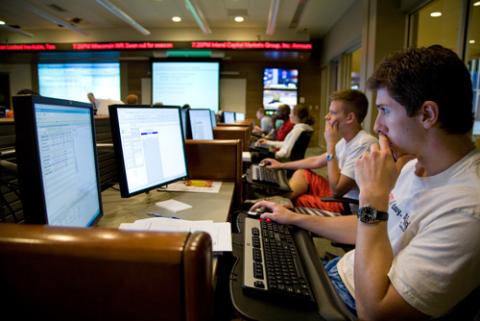Freeman to host first energy trading competition
The Freeman School has earned a national reputation in recent years for its use of cutting-edge technology to teach energy trading. Next month, Freeman takes another step toward establishing itself as one of the nation's leading institutions for the study of energy with the first Tulane Energy Trading Competition.
The Tulane Energy Trading Competition will take place on Nov. 13 and 14 in the Freeman School's trading center. Twenty-eight students from five top business schools will travel to New Orleans to put their skills to the test in a unique competition with highly coveted internships at top trading firms on the line.

What makes the Tulane competition unique is that participants will be judged not solely on profit but on risk-adjusted returns and the ability to articulate and execute a logical trading strategy, a crucial distinction according to Joe LeBlanc, assistant director of the Tulane Energy Institute and organizer of the event.
"The idea was to create a trading competition that is more aligned with what employers want in the marketplace," says LeBlanc. "We think that by adjusting for risk, combining several different performance measures and using the best trading software from Trading Technologies and Thomson Reuters, we're creating a competition that rewards responsible trading and more accurately reflects the way trading is truly practiced in today's energy firms."
The competition began on Oct. 12 with a two-week remote phase for 21 teams from 13 business schools. Each team was given a mock $100,000 to trade and was required to execute at least five trades per day. While most trading competitions reward the team or individuals who generate the highest profit, the Tulane Energy Trading Competition uses a method for measuring investment risk known as the Ulcer Performance Index to penalize teams that take on too much risk.
At the end of the two weeks, the members of the top seven teams qualified to participate as individuals in the final round in New Orleans.
Another innovation of the competition is the prize structure. Rather than cash prizes, the Tulane Energy Trading Competition will offer internships with Webster Capital on the CME/NYMEX, Luminant Energy and Mirant Energy to the top three participants. While most trading competitions award cash prizes to students, LeBlanc says that sends the wrong message to the public at a time when many people blame high energy prices on speculation.
"We think awarding internships is the right thing to do because students want jobs and internships more than anything," says LeBlanc. "It also supports the mission of the Freeman School by providing an opportunity for students to further their education through an opportunity with a top energy trading firm."
The Tulane Energy Trading Competition is presented by the Tulane Energy Institute and the Tulane Energy Club and sponsored by CME Group, Trading Technologies and Thomson Reuters. For more information about the competition, visit http://trading.tulane.edu or contact Joe LeBlanc at 504-314-2662 or jleblan@tulane.edu.
Interested in advancing your education and/or career? Learn more about Freeman’s wide range of graduate and undergraduate programs. Find the right program for you.
Other Related Articles
- De Franco appointed Keehn Berry Chair of Banking and Finance
- The Wall Street Journal: For Trump, the Warner Megadeal Talks Are All About CNN
- Research Notes: Matthew Higgins
- New Goldring Institute director hopes to expand international partnerships
- New study shows how personal profiles transform social media customer service
- Research Notes: Shuhua Sun
- Newsweek: The Real Cost of Layoffs Isn’t In the Financials
- Research Notes: Yang Pan
